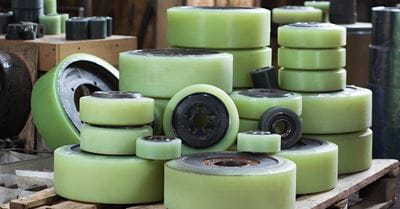Forklift Tires | Tucson

We supply tires for all forklifts, not just Raymond!
Raymond maintains one of the largest material handling parts divisions in the West.
Call now and let us help you find the parts you need:
(520) 729-4222
Lift trucks can be purchased in a variety of sizes and shapes, and each sort of forklift has a different set of tires. Usually, tires are classified as pneumatic or cushion, although distinctions extist within those options. Pneumatic tire and cushion tire lift trucks have differing frames, which makes them not cross-compatible.
Although your forklift tires are durable and tough, they do need to be replaced periodically. Raymond West has tires for a broad selection of forklifts at highly competitive prices.
Cushion Tires
Also referred to as Press On Tires, this type of tire is most often used indoors, and sometimes outside on smooth surfaces. Press on tires are of a shorter diameter compared to other sorts of lift truck tires, and as such have a narrower turning radius. This makes them ideal for narrower spaces such as warehouse aisles. Mounting a cushion tire onto a lift truck wheel mandates the use of a hydraulic press.
As part of the cushion tire selection, two standard types are present:
Rubber Cushion Tires: Rubber cushion tires are used indoors or on level surfaces outside such as asphalt or concrete. They consist of solid rubber, molded around a solid steel band. This sort of tire can be smooth or have a tread. Frequently the front tires will be treaded while the rear tires used for steering are smooth.
Polyurethane Cushion Tires: Solid poly tires work with heavier loads compared to rubber tires, and are ideal for narrow aisles, order pickers and other warehouse jobs. These lightweight tires are more resistant to splitting, tearing, and chunking as opposed to rubber, and they can last up to twice as long as rubber with proper care.
Pneumatic Tires
Pneumatic and solid pneumatic tires are commonly used outside, and are better suited for uneven or rough surface conditions compared to cushion tires. They possess noteworthy traction and higher ground clearance which makes them suited for uneven terrain.
Regular Pneumatic Tires: This kind of pneumatic is inflated with air, and works best with the roughest surfaces where shock absorption is important, both for the forklift’s longevity and the comfort of the operator. The downside of these tires is that they are susceptible to punctures, and they are sometimes filled with foam instead of air in order to prevent flats.
Solid Pneumatic Tires: Solid pneumatic tires are designed for flat surface inside and outside heavy duty situations. Constructed with solid rubber and basically puncture resistant, they are the best option for environments with pointy objects, such as construction sites or recycling yards.
Non Marking Tires
Solid, solid pneumatic, and pneumatic tires have non-marking options available. They are constructed using hydrated silicas and other additives to avoid leaving floors marred by black marks.
These kinds of tires are commonly used in retail or any spots where unmarked floors are important. They are likewise used in certain industrial or food processing plants where cleanliness and dust reduction are concerns.
There are some drawbacks to using non-marking tires. The first is that they don’t tend to share the durability of other tires and as such need to be replaced more often. One more problem is that they are more prone to static electricity buildup, and any forklift with them needs to be set up with static remediation technology.
Forklift Tires Near Me
With proper maintenance, your forklift tires can decrease energy consumption, greatly improve operator comfort, and enhance your collective productivity. To chat with a lift truck tire expert, give Raymond West a call today!
Raymond West's Tucson facility serves Pima County, including Tucson, South Tucson, Marana, Oro Valley, Sahuarita and surrounding areas
Raymond West | Tucson Forklift Dealer
Tucson Service Area
(520) 729-4222

